No disrespect meant to Abner Doubleday or Alexander Cartwright or anybody else who might claim responsibility for the game we call baseball, but Thutmose III had them beat by three millennia or so. Thutmose ruled Egypt during the 15th century BC, and is the first known pharaoh to have depicted himself in a ritual known as "seker-hemat," which Peter Piccione has loosely translated as "batting the ball."
"The word they use is `sequer,' which literally means `to strike' or `to hit,"' said Piccione, 51, an Egyptologist and professor of comparative ancient history at the College of Charleston in South Carolina, "but in the context, he's there with the bat. I translated it as `batting the ball."'
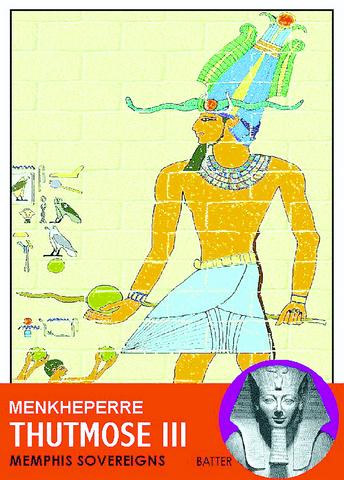
PHOTO: NYT
The context he's referring to is a wall relief at the shrine of Hathor, the goddess of love and joy, in Hatshepsut's temple at Deir-el-Bahari, where Thutmose is seen holding a softball-size ball in one hand and a long stick, wavy at the end, in the other. The hieroglyphic over the scene reads: "Batting the ball for Hathor, who is foremost in Thebes." The date is 1475 BC.
Piccione makes a specialty of Egyptian religion.
He's particularly interested in the sports and games that the ancient Egyptians included in festivals honoring certain deities, a pursuit that led him to muse on the relationship between ancient Egyptian "baseball" and American baseball.
His findings are included in a popular lecture -- called "Pharaoh at the Bat" -- that he recently delivered in Charleston and has been honing since delivering a paper on the subject at the National Baseball Hall of Fame in 1995. In it, he describes a relationship similar to the one between, say, pterodactyls and cardinals, orioles or blue jays.
"There's no direct connection, and Egyptians don't play anything like this at all today," Piccione said. "But the Egyptian game did function as a precursor. There are only a few bat and ball games that have ever been around."
Actually, Piccione said, Egyptians probably batted the ball around, even if it was just for infield practice or a game of pepper, for nearly 1,000 years before Thutmose III. There are references to the activity in inscriptions inside the pyramids dating to 2400 BC.
Evidently the Egyptians weren't merely sluggers. They had a healthy respect as well for defense; the picture of Thutmose also shows two priests, small figures, in the act of catching a ball.
"They have their arms raised up and balls in their hands like you would catch a softball," Piccione said. "The inscription says, `Catching it for him by the servants of the gods."'
It isn't known precisely how the game was played, or if the umpires wore chest protectors. "To be honest, we don't know if they did any running," Piccione said, "but I suspect they did, because kings did a lot of running rituals."
Actually, the connections Piccione's lecture makes between then and there and here and now are more broadly cultural in nature.
"It started in Egypt as purely a boys' game," said Piccione. "And it was probably played in a festival, so the actual ball-playing took on some kind of religious meaning because it was played in a religious context."
When the king came out and played, therefore, the excitement and fun of the game and its religious meaning were consolidated, he said.
"Baseball functions the same way," he said. "Over time it has accumulated meaning. It's an interesting parallel development."
He cites the idea that every spring baseball starts up again, and as such it has become a ritual of the season. He cites the mythology that grows up around the players and lasts for generations, the near godliness of figures like Babe Ruth, the identification of the game with our country.
Happily, both in his lecture and in the interview, Piccione stopped before his musings got too ponderous. He finished both with a reading from his own version of Ernest Lawrence Thayer's Casey at the Bat, which ends, alas, just as badly for the home team: "O' somewhere in the Aten's circuit, the sun is shining bright, Nubian drums play somewhere and Hittite hearts are light/In Babylon men are laughing, in Nineveh children shout, But there is no joy in Mud-brickville, Great Pharaoh has struck out."
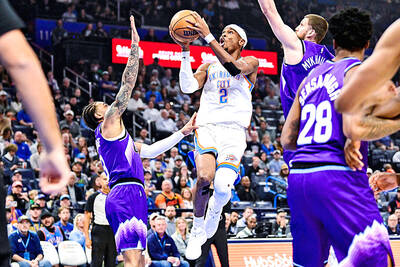
MOTHER KNOWS BEST: Warriors’ coach Kerr said his 91-year-old mother criticized him for his attitude toward officials that led to his ejection from Monday’s game Shai Gilgeous-Alexander on Wednesday rescued the Oklahoma City Thunder with a game-tying buzzer-beater before finishing with 46 points in a 129-125 overtime victory against the Utah Jazz. The reigning NBA champions looked to be heading for a third straight loss after the Jazz inched into a 114-112 lead following Lauri Markkanen’s layup with just three seconds remaining in the fourth quarter. However, NBA Most Valuable Player Gilgeous-Alexander drained a superb 13-foot jump shot to tie it up at 114-114 as the buzzer sounded to send the game into overtime. Gilgeous-Alexander then took over in the extra period with nine points as the Western
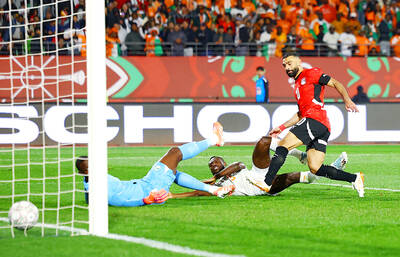
Mohamed Salah’s Egypt knocked reigning champions Ivory Coast out of the Africa Cup of Nations (AFCON) with a 3-2 win in the quarter-finals on Saturday, while Victor Osimhen starred as Nigeria beat Algeria 2-0 to set up a clash with hosts Morocco. In Agadir, Morocco, a thrilling last-eight tie saw Omar Marmoush and Ramy Rabia net in the first half for the Pharaohs before an own goal by Ahmed Aboul-Fetouh brought the Ivorians back into it. Salah then got Egypt’s third early in the second half and they held on after Guela Doue again reduced the deficit. Egypt is to face Senegal
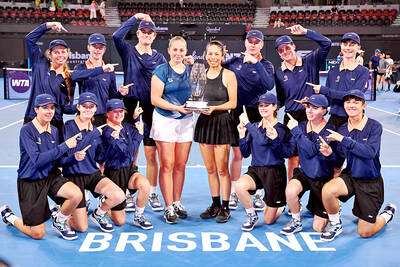
AUSTRALIAN ADVENTURE: Sabalenka aims to follow up with a third Australian Open win, while Taiwanese Joanna Garland claimed a WTA 125 title in Canberra Aryna Sabalenka beat Karolina Muchova in straight sets to reach her third Brisbane International final in a row yesterday, a week ahead of the Australian Open. Sabalenka looked in great touch against the tricky Czech, who had won their last three meetings and went into the match as one of the few players with a winning record over the world No. 1. However, Sabalenka showed her class and power as she broke Muchova once in each set to take the semi-final 6-3, 6-4 in 89 minutes to face Ukraine’s Marta Kostyuk in the final. “I struggled against her a couple of times [in
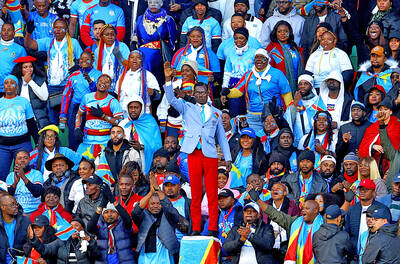
His team were knocked out of the Africa Cup of Nations (AFCON) in agonizing fashion on Tuesday, but the Democratic Republic of the Congo’s (DR Congo) human statue Michel Kuka Mboladinga would be remembered as the tournament’s most remarkable supporter. The colorfully dressed Kuka has earned fame as the fan who stands completely immobile throughout his team’s games, looking toward the sky with his right arm raised and palm open. He has become a media star and on Tuesday was accompanied by a delegation of several hundred Congolese supporters whose trip to Morocco was paid for by the country’s government. They took their